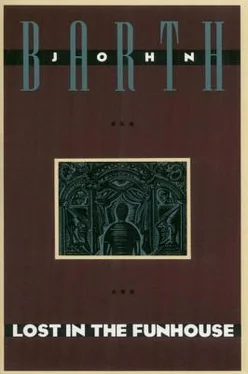John Barth - Lost in the Funhouse
Здесь есть возможность читать онлайн «John Barth - Lost in the Funhouse» весь текст электронной книги совершенно бесплатно (целиком полную версию без сокращений). В некоторых случаях можно слушать аудио, скачать через торрент в формате fb2 и присутствует краткое содержание. Год выпуска: 2014, ISBN: 2014, Издательство: Knopf Doubleday Publishing Group, Жанр: Современная проза, на английском языке. Описание произведения, (предисловие) а так же отзывы посетителей доступны на портале библиотеки ЛибКат.
- Название:Lost in the Funhouse
- Автор:
- Издательство:Knopf Doubleday Publishing Group
- Жанр:
- Год:2014
- ISBN:978-0-8041-5250-1
- Рейтинг книги:3 / 5. Голосов: 1
-
Избранное:Добавить в избранное
- Отзывы:
-
Ваша оценка:
- 60
- 1
- 2
- 3
- 4
- 5
Lost in the Funhouse: краткое содержание, описание и аннотация
Предлагаем к чтению аннотацию, описание, краткое содержание или предисловие (зависит от того, что написал сам автор книги «Lost in the Funhouse»). Если вы не нашли необходимую информацию о книге — напишите в комментариях, мы постараемся отыскать её.
Lost in the Funhouse — читать онлайн бесплатно полную книгу (весь текст) целиком
Ниже представлен текст книги, разбитый по страницам. Система сохранения места последней прочитанной страницы, позволяет с удобством читать онлайн бесплатно книгу «Lost in the Funhouse», без необходимости каждый раз заново искать на чём Вы остановились. Поставьте закладку, и сможете в любой момент перейти на страницу, на которой закончили чтение.
Интервал:
Закладка:
“ ‘ “ ‘ “What a question!” ’ ” ’
“ ‘What’s the answer?’
“ ‘ “ ‘ “ ‘Seven years of this, more or less, not much conversation, something wrong with the marriage. Helen he could hold; how hold Menelaus? To love is easy; to be loved, as if one were real, on the order of others: fearsome mystery! Unbearable responsibility! To her, Menelaus signified something recognizable, as Helen him. Whatever was it? They begot a child …’ ” ’ ”
“ ‘ “I beg your pardon,” Helen interrupted from the poop a quarter-century later. “Father Zeus got Hermione on me, disguised as you. That’s the way he is, as everyone knows; there’s no use pouting or pretending …”
“ ‘I begged her pardon, but insisted, as in Troy: “ ‘ “ ‘It wasn’t Zeus disguised as Menelaus who begot her, any more than Menelaus disguised as Zeus; it was Menelaus disguised as Menelaus, a mask masking less and less. Husband, father, lord, and host he played, grip slipping; he could imagine anyone loved, no accounting for tastes, but his cipher self. In his cups he asked on the sly their house guests: “Why’d she wed me, less horsed than Diomedes, et cetera?” None said. A night came when this misdoubt stayed him from her bed. Another …’ ” ’ ” ’ ”
Respite. I beg your pardon.
“ ‘ “ ‘ “ ‘Presently she asked him: et cetera. If only she’d declared, “Menelaus, I wed you because, of all the gilt clowns of my acquaintance, I judged you least likely to distract me from my lovers, of whom I’ve maintained a continuous and overlapping series since before we met.” Wouldn’t that have cleared the Lacedemonian air! In a rage of shame he’d’ve burned up the bed with her! Or had she said: “I truly am fond of you, Menelaus; would’ve wed no other. What one seeks in the husband way is a good provider, gentle companion, fit father for one’s children whoever their sire — a blend in brief of brother, daddy, pal. What one doesn’t wish are the traits of one’s lovers, exciting by night, impossible by day: I mean peremptory desire, unexpectedness, rough play, high-pitched emotions of every sort. Of these, happily, you’re free.” Wouldn’t that have stoked and drafted him! But “Love!” What was a man to do?’
“ ‘(“((’(((“ ‘Well …’ ”)))’))”)’
“ ‘ “ ‘ “ ‘He asked Prince Paris—’ ‘You didn’t!’ ” “By Zeus!” ’ ‘By Zeus!’ ” “You didn’t!” ’ ‘Did you really?’ ” “By Zeus,” I tell me I told all except pointed Helen, “I did.
“ ‘ “ ‘ “ ‘By Zeus,’ I told pointed Helen, ‘he did. Oh, he knew the wretch was eyes and hands for Helen; he wasn’t blind; eight days they’d feasted him since he’d dropped in uninvited, all which while he’d hot-eyed the hostess, drunk from her goblet, teased out winy missives on the table top. On the ninth she begged Menelaus to turn him from the palace. But he confessed,’ I confessed,” I confessed,’ I confessed,” et cetera, “ ‘ “ ‘he liked the scoundrel after all …’ ” ’ ” ’
“ ‘Zeus! Zeus!’
“ ‘ “ ‘ “ ‘Young, rich, handsome he was, King Priam’s son; a charmer, easy in the world …’ ” ’ ”
“ ‘ “Don’t remind us!”
“ ‘ “ ‘ “One night Helen went early to her chamber, second on one’s left et cetera, and the two men drank alone. Menelaus watched Paris watch her go and abruptly put his question, how it was that one less this than that had been the other, and what might be the import of his wife’s reply. “A proper mystery,” Paris agreed; “you say the one thing she says is what?” Menelaus pointed to the word his nemesis, by Paris idly drawn at dinner in red Sardonic.
“ ‘ “ ‘ “ ‘ “Consult an oracle,” Paris advised. “There’s a good one at Delphi.” “I’m off to Crete,” Menelaus told breakfast Helen. “Grandfather died. Catreus. Take care of things.”
“ ‘ “ ‘ “ ‘ “Love!” she pled, tearing wide her gown. Menelaus clapped shut his eyes and ears, ran for the north.’ ” ’ ” ’
“ ‘North to Crete?’ ‘Delphi, Delphi, “ ‘ “ ‘where he asked the oracle: “Why et cetera?” and was told: “No other can as well espouse her.”
“ ‘ “ ‘ “ ‘ “How now!” Menelaus cried,’ I ditto,” et cetera. “ ‘ “Espouse? Espouse her? As lover? Advocate? Husband? Can’t you speak more plainly? Who am I?”
“ ‘ “ ‘ “ ‘ ” ’ ” ’ ” ’ ”
…
“ ‘ “ ‘ “ ‘Post-haste he returned to Lacedemon, done with questions. He’d re-embrace his terrifying chooser, clasp her past speech, never let go, frig understanding; it would be bride-night, endless; their tale would rebegin. “Menelaus here!” His shout shook the wifeless hall.
7
“ ‘ “ ‘ “ ‘Odysseus outsmarted, unsmocked Achilles, mustered Agamemnon — all said: “Let her go.” Said Menelaus: “Can’t.” What did he feel? Epic perplexity. That she’d left him for Paris wasn’t the point. War not love. Ten years he played outraged spouse, clung ireful-limpetlike to Priam’s west curtain, war-whooped the field of Ares. Never mind her promenading the bartizans arm in arm with her Troyish sport; no matter his seeing summerly her belly fill with love-tot. Curiosity was his passion, that too grew mild. When at last in the war’s ninth year he faced Paris in single combat, it was purely for the sake of form. “I don’t ask why she went with you,” he paused to say. “But tell me, as I spear you: did Helen ever mention, while you clipped and tumbled, how she happened to choose me in the first place?” Paris grinned and whispered through his shivers: “Love.” Aphrodite whisked him from the door of death; no smarterly than that old word did smirking Pandarus pierce Menelaus’s side. War resumed.
“ ‘ “ ‘ “ ‘Came dark-horse-night; Paris dead, it was with her new mate Deiphobus Helen sallied forth to mock. When she had done playing each Greek’s Mrs., in her own voice she called: “Are you there, Menelaus? Then hear this: the night you left me I left you, sailed off with Paris and your wealth. At our first berthing I became his passion’s harbor; to Aphrodite the Uniter we raised shrines. I was princess of desire, he prince; from Greece to Egypt, Egypt Troy, our love wore out the rowing-benches. By charms and potions I kept his passion nine years firm, made all Troy and its beleaguerers burn for me. Pederast Achilles pronged me in his dreams; before killed Paris cooled, hot Deiphobus climbed into his place: he who, roused by this wooden ruse, stone-horses your Helen even as she speaks. To whom did slick Odysseus not long since slip, and whisper all the while he wooed dirty Greek, welcome to my Troy-cloyed ear? Down, godlike Deiphobus! Ah!”
“ ‘ “ ‘ “ ‘Heart-burst, Menelaus had cracked with woe the Epeian barrel and his own, had not far-sight Odysseus caulked and coopered him, saying: “The whore played Clytemnestra’s part and my Penelope’s; now she plays Helen.” So they sat in silence, murderous, until the gods who smile on Troy wearied of this game and rechambered the lovers. Then Odysseus unpalmed the mouth of Menelaus and declared: “She must die.” Menelaus spat. “Stick her yourself,” went on the Ithacan: “play the man.”
“ ‘ “ ‘ “ ‘The death-horse dunged the town with Greeks; Menelaus ground his teeth, drew sword, changed point of view. Taking his wronged part, I invite one word before I cut your perfect throat. What did the lieless oracle intend? Why’d you you-know-what ditto-whom et cetera?’
6
“ ‘ “ ‘ “Replied my wife in a huskish whisper: ‘You know why.’
“ ‘ “ ‘ “I chucked my sword, she hooked her gown, I fetched her shipward through the fire and curses, she crossed her legs, here I weep on the beach at Pharos, I wish I were dead, what’d you say your name was?”
Читать дальшеИнтервал:
Закладка:
Похожие книги на «Lost in the Funhouse»
Представляем Вашему вниманию похожие книги на «Lost in the Funhouse» списком для выбора. Мы отобрали схожую по названию и смыслу литературу в надежде предоставить читателям больше вариантов отыскать новые, интересные, ещё непрочитанные произведения.
Обсуждение, отзывы о книге «Lost in the Funhouse» и просто собственные мнения читателей. Оставьте ваши комментарии, напишите, что Вы думаете о произведении, его смысле или главных героях. Укажите что конкретно понравилось, а что нет, и почему Вы так считаете.












